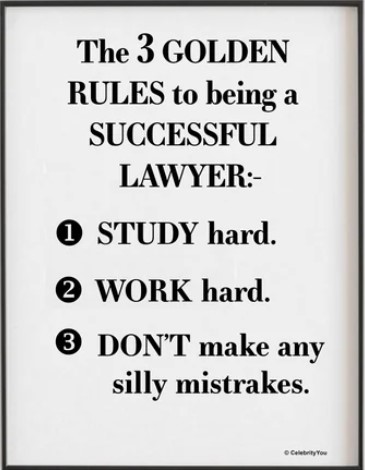
This little dose of humor is brought to you by AutoGrabBag.com.
We are a small faith-based car accessory gift store.


This little dose of humor is brought to you by AutoGrabBag.com.
We are a small faith-based car accessory gift store.


If your looking for a “cream of the crop” legal research tool then you should buy a subscription to an expensive service like Westlaw Next or Lexus Research. But if your looking for a convenient and simple “one-stop” (and did I mention free) legal research tool then the best option for Minnesota legal practitioners is the “Minnesota Judicial Training & Education Blog”
In addition to the Blog site containing the complete repository of all past Judicial Training Updates, it is also home to the most comprehensive convenient and free legal research tool that I’ve been able to find for Minnesota legal practitioners.
This legal research site was created out of frustration with my inability to find a centralized website that could give me direct links to the legal resources that attorneys, judges and other legal practitioners use on a regular basis. I wanted simple, direct and convenient.
This Update (20-04) gives you a short introduction to this new online legal research library.

In a perfect world judges make decisions by applying legal analysis to the
facts of a case in a rational, fair and deliberate manner. But in the real world, judges, despite their best efforts, are often subject to the same foibles, biases and imperfections that affect everything humans do.
One of those rarely discussed factors that every judge and attorney should
be aware of is referred to as JUDICIAL DECISION FATIGUE.

One of the most common complaints raised by judges regarding written submissions filed by attorneys, guardians, child protection workers (and others), involves an issue that is surprisingly easy to fix .
There is a myriad of publications dedicated to the improvement of legal writing. Unfortunately, you often need an English degree to understand anything past the first paragraph. There is, however, a simple way to dramatically improve any style of legal writing that has nothing to do with dangling participles or misuse of pronouns.
This Training Updates explains how to accomplish that goal.

Have you ever felt down and out; like life itself was falling from you and it seemed like a major effort just to take care of the everyday mundane things? Of course you have, it’s called being human.
No one person that I have ever encountered has been perfect (except Mike Brandt comes pretty damn close). We all have set-backs, challenges and days where nothing seems to go right; it is a part of life and living. So today, instead of addressing a legal or evidentiary topic, I am going to share a concept with you that can literally change your outlook on life as it illuminates your path to happiness and well-being. That one concept, among many, is gratitude.
Now I know what some of you are thinking. Half of everyone reading this post is probably groaning to themselves, urgggg…. another touchy feely topic. But not so fast, the power of gratitude is much more than just a touchy feely concept. The physical and emotional benefits that flow from expressions of gratitude are well supported by science. So for all of you logic based non-believers let’s talk a little science.
The science of Gratitude
One of the main features of gratitude is that it can help you feel more connected, relaxed and optimistic. When you express gratitude some pretty amazing things happen inside your brain. For example, neurotransmitters and brain chemicals are released like dopamine, beta endorphins and the love drug oxytocin. All of these cause you to experience greater well-being, higher self-esteem and a general sense that everything is going to be OK despite the issues at play in that moment.
When you express genuine gratitude, your system is more resilient and robust. When in the state of being grateful your ventral vegus nerve becomes activated and your ventral vegal tone is made stronger as evidenced by your heart rate variability increasing, which has a direct impact on your cardio vascular health. The vegus nerves are part of your parasympathetic nervous system; which are part of your Autonomic Nervous System that takes care of so many of the involuntary and critical parts of our system like beating your heart and controlling breathing. Heartfelt gratitude can activate the ventral vegus nerve, counteracting stress and anxiety and initiating a calm all over your body which promotes a greater sense of social safety.
Prevalence of Gratitude Across Cultures and Spiritual Traditions
Whether you’re into science or not, at the surface level, gratitude can be viewed as a simple tool for successful living. At its core, though, gratitude is really an approach to life or stated more boldly, it is a way of life. All spiritual traditions include gratitude among their highest virtues. For example, here is a quote attributed to Gautama Buddha:
“Let us rise up and be thankful, for if we didn’t learn a lot today, at least we learned a little, and if we didn’t learn a little, at least we didn’t get sick, and if we got sick, at least we didn’t die; so, let us all be thankful.”
Melody Beattie wrote in her book, Codependence No More, “Gratitude unlocks the fullness of life. It turns what we have into enough, and more. It turns denial into acceptance, chaos to order, confusion to clarity. It can turn a meal into a feast, a house into a home, a stranger into a friend. Gratitude makes sense of our past, brings peace for today, and creates a vision for tomorrow.”
Gratitude and the Practice of Law
As a prior trial attorney and judge, I always tried to champion the primary importance of psychology in trial practice. Being in the proper mental state is a skill central to all successful attorneys. Gratitude opens the heart and mind, putting you in a position of patience and acceptance. Patience, as in methodical step by step trial preparation; and acceptance, as in the ability to accept a trial verdict or judicial decision that you did not want, are both paramount in the life of a legal practitioner. If you approach each trial (or anything else in life) with a grateful attitude, you put yourself in the best possible mental state to effectively present and argue your case.
An Easy Choice
Every day when you wake up you have a fundamentally important choice to make between two possible daily mindsets:
When you read those two choices, no one would consciously pick the second one. Yet when the bell rings and your day begins, many attorneys (and judges) allow themselves to revert to an adversarial mental state (choice #2). Besides the negative affect on the quality of your own life, a non grateful daily attitude also has a profound impact on how you are perceived by others, including your friends and colleagues. Of course, most of you already know which local attorneys and judges fall into that second category. Don’t be one of them.
Final Thoughts
As you return to work following the Christmas holidays, take some time to give thanks for your many blessings, regardless of where you live or practice. And then, make a concerted effort to carry that grateful attitude with you to the courthouse or wherever else you work. You will be pleasantly surprised by how such a small change in approach can make your journey more enjoyable and productive, for both yourself and those around you!
Happy New Year,
Alan F. Pendleton (Former District Court Judge)
763-498-1508; afpendleton@gmail.com
December 25, 2017
References: Dr. M. Woodruff Johnson is the former Executive Director of the Kaiser Permanente, Watts Counseling and Learning Center. He holds certifications in Accelerated Learning, Neurosensory Development and hypnotherapy, and he is a Certified NLP Master Practitioner. Dr. Johnson is also an Associate Professor and teaches graduate psychology courses at Pacific Oaks College and Ryokan College; D.R. Barton, Jr. at vantharp.com.
Apps for any screen
A great WordPress.com site
The California lawyer’s trusted source for fast, relevant, and practical legal guidance.
Dedicated to the Training & Education of the Minnesota Bench and Bar
Inspiration and tools for better blogging from WordPress.com
The latest news on WordPress.com and the WordPress community.
Dedicated to the Training & Education of the Minnesota Bench and Bar
Dedicated to the Training & Education of the Minnesota Bench and Bar
Dedicated to the Training & Education of the Minnesota Bench and Bar
Dedicated to the Training & Education of the Minnesota Bench and Bar
Dedicated to the Training & Education of the Minnesota Bench and Bar
more
Dedicated to the Training & Education of the Minnesota Bench and Bar
Dedicated to the Training & Education of the Minnesota Bench and Bar
Dedicated to the Training & Education of the Minnesota Bench and Bar